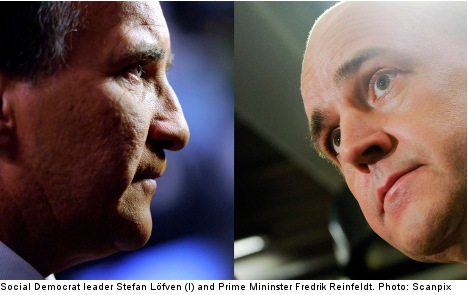While Reinfeldt, whose four-party centre-right coalition is hoping for a third election victory in September 2014, accused Löfven of preaching “placard politics”, the opposition leader countered that the government is satisfied with politics that fail to combat unemployment.
Jobs, taxes, and schools were the main themes of Monday night’s debate, televised live on Svergies Television (SVT) news magazine programme Aktuellt.
Reinfeldt did his best to defend the government’s plans for a fifth round of income tax reductions.
“We’re doing what we promised and wide swaths of wage earners are going to have more money in their pockets while you [the Social Democrats] want to expand benefits,” the prime minister argued.
Löfven countered that Sweden needed to make investments rather than lower taxes with “borrowed money”.
“You talk about energy, but you don’t create any jobs,” he said, referring to government claims that the new tax cuts would energize the Swedish economy.
Löfven added that Reinfeldt’s promise to both cut taxes and invest in schools was impossible to fulfill.
The prime minister then heckled the Social Democrat leader for not being willing to scrap the tax cuts should there be a shift in power following the next election. He also panned Löfven’s suggestion of scaling back tax reductions for the highest earners.
“That’s just placard politics,” said Reinfeldt before questioning Löfven on what sort of government he planned on putting together should the Social Democrats win back power.
While the Social Democrats created a clear red-green alternative together with the Left Party and the Greens in the run up to the 2010 elections, the three centre-left parties have yet to form a concrete coalition as the 2014 race draws closer.
“Fredrik Reinfeldt should be careful when it comes to talking about governing coalitions,” Löfven responded, hinting at poll numbers suggesting that two parties in Reinfeldt’s current Alliance coalition, the Christian Democrats and the Centre Party, may have trouble garnering enough votes to maintain representation in the Riksdag.
Following the debate, the prime minister said the exchange provided an indication of how the 2014 election race will play out.
“It’s our views on jobs, on how we manage the economy, and how we, as I like to say, can combine job creation policies with investments in the core of the welfare system,” he told the TT news agency.
“That stands in contrast to the direction the Social Democrats want to take by raising taxes by over 30 billion ($4.6 billion) on production and on new employment – especially of young people – which they then want to use to finance a massive expansion of the benefits system.”
Löfven agreed that voters got a clear idea of what differentiated the two sides’ policies.
“We have one alternative that only wants to cut taxes and then we have an alternative that instead wants to invest in more jobs and in schools and welfare,” Löfven told TT.
TT/The Local/dl




 Please whitelist us to continue reading.
Please whitelist us to continue reading.
Member comments